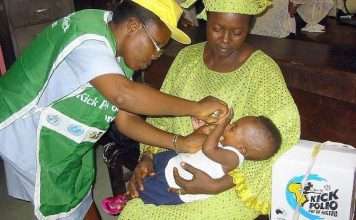A recent World Health Organization (WHO) report placed Nigeria at the top of the 2022 list of countries with the most children who have not received any vaccinations, with an estimated 2.3 million children lacking access to essential immunizations, representing 16% of the global total.
The 2023 report highlighted significant public health achievements despite growing global health challenges fueled by conflict, climate change, and disease outbreaks.
The report was released ahead of the 77th World Health Assembly, taking
place from May 27 to June 1, 2024.
The term “zero-dose children” refers to those who have not received routine vaccinations, specifically lacking the first dose of the diphtheria-tetanus-pertussis (DTP) vaccine, indicating a significant gap in healthcare access.
“The world is off track to reach most of the triple billion targets and the health-related Sustainable Development Goals,” said WHO Director-General, Dr Tedros Ghebreyesus.
“However, with concrete and concerted action to accelerate progress, we could still achieve a substantial subset of them. Our goal is to invest even more resources where they matter most—at the country level—while ensuring sustainable and flexible financing to support our mission.”
“Nigeria ranks first in the top 20 zero-dose countries list of 2022, with over 2.3 million estimated zero-dose children, about 16 per cent of the global total.
“The country also has the largest number of zero-dose children impacted by conflict. The Government of Nigeria has, rightly, prioritised reaching communities with a high burden of zero-dose children in its National Strategy for Immunisation and Primary Health Care System Strengthening.
“The goal is to reduce the number of affected children by at least 80% by the end of 2028,” the report mentioned.
In 2023, the World Health Organization’s African Regional Office identified the top 10 countries with the largest number of unvaccinated children, including Nigeria, Ethiopia, the Democratic Republic of the Congo, Angola, Tanzania, Madagascar, Mozambique, Mali, Chad, and Cameroon.
These countries account for approximately 80% of the total number of unvaccinated children between 2019 and 2022.
The World Health Assembly’s Immunization Agenda 2030 has set a strategic priority goal to enhance vaccination coverage and equity, with a focus on reducing the number of children who remain unvaccinated.
“Recognising that health-related complexities associated with zero-dose communities require cross-sectoral collaboration and strong partnerships, starting in 2020, the Ministry of Health, with support from WHO, used the multilateral collaboration platform, the Global Action Plan for Healthy Lives and Well-being for All to ensure a robust implementation of the NSIPSS, and specifically, to help identify and reach zero-dose communities with immunisation services through the PHC system.
“This aligns with Output 4.2.1 of the 2022-2023 WHO Programme Budget.”
According to the report, a significant milestone was achieved between March 2021 and January 2023, with over six million children gaining access to vital immunization services, resulting in more than five million children receiving the crucial third dose of the pentavalent vaccine (Penta3) every year, protecting them from life-threatening diseases.
“High-quality and fit-for-purpose data is essential to identify communities targeted for health interventions. In 2020, Nigeria’s National Primary Health Care Development Agency created a data system to locate zero-dose communities, with support from WHO and the United Nations Children’s Fund.
“Immunisation records, health facilities, surveys, local community data at the sub-national level, and other data sources were consolidated.
“Stakeholder workshops and meetings were organised to analyse the data, which indicated that targeting 100 local government areas in 18 states would reach 1.5 million zero-dose children out of the 2.3 million nationally and, improve immunisation coverage. The detailed analysis informed revisions to the zero-dose priority actions within the NSIPSS,” it stated.
The report emphasized that significantly improving childhood vaccination coverage in Nigeria will necessitate a dedicated and long-term effort to identify and reach every child who has not received any vaccinations (zero-dose child) and every community that has been missed, ensuring that no one is left behind.
